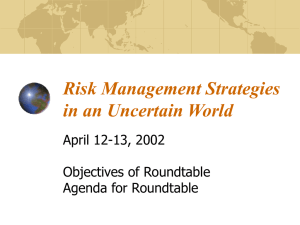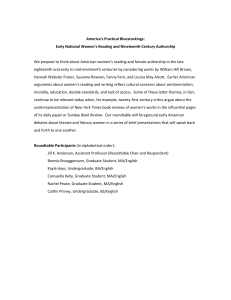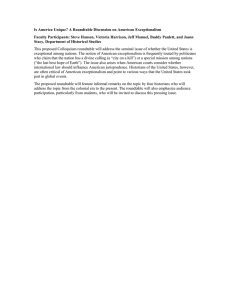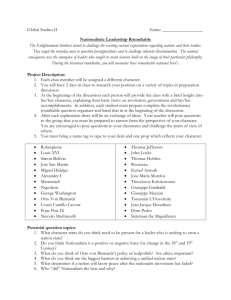Corporate Governance in Eurasia: A Comparative Overview Elena Miteva Administrator
advertisement
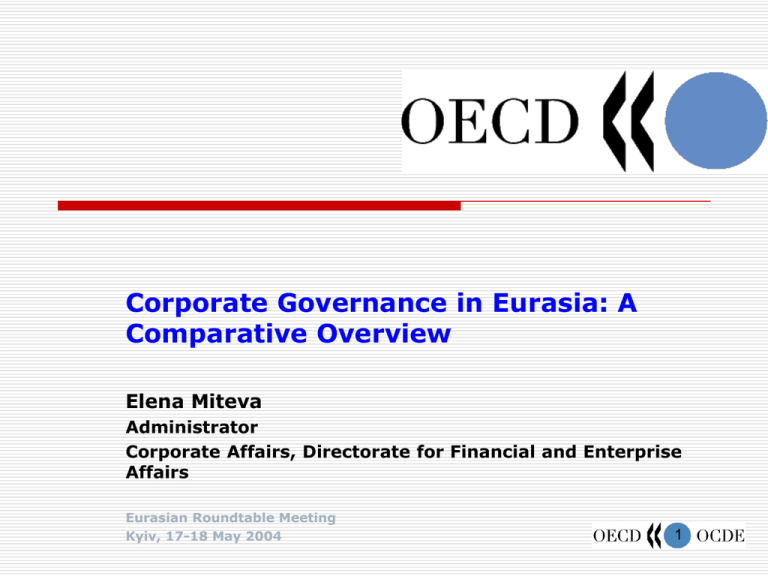
Corporate Governance in Eurasia: A Comparative Overview Elena Miteva Administrator Corporate Affairs, Directorate for Financial and Enterprise Affairs Eurasian Roundtable Meeting Kyiv, 17-18 May 2004 1 Corporate Governance in Eurasia: A Comparative Overview The Eurasian Roundtable Process Main Priorities Next Steps 2 The Eurasian Roundtable is a part of the OECD and the World Bank initiative to organise and lead five regional roundtable to raise awareness and to develop regional self-assessments of CG successes and areas for future reforms Regions Asia, Russia, Latin America, South-eastern Europe, Eurasia Format Peer discussion among senior policy makers, academics and businessmen using the OECD Principles for CG as a conceptual framework Goals Policy dialogue on realising the OECD Principles in each country of the region; Self-assessment and regional comparison of successes and areas requiring further effort; Knowledge sharing and networking among key regional decision makers Output White paper or comparative paper describing the state of CG in region and identifying areas for future reform as a blueprint for future policy work and technical assistance 3 Between 2000 and 2004, the Eurasian Roundtable met four times to assess regional developments in order to release a comparative overview of CG frameworks and practices and identify common policy objectives 2000 2001 2002 2003 First Roundtable: CG Overview Kyiv Cabinet of Ministers Second Roundtable: Transparency and Disclosure Tbilisi Securities Commission Stock Exchange IRFAAE Third Roundtable: Shareholder Rights and Equitable Treatment Fourth Roundtable: Kyiv SSMSC, PFTS, SPF Bishkek SCSM, CDC Responsibilities of the Board Role of Stakeholders 4 Corporate Governance in Eurasia: A Comparative Overview The Eurasian Roundtable Process Main Priorities Next Steps 5 The Comparative Overview puts forth seven priority recommendations for CG reform Promote private sector development Intensify privatisation Improve governance of state-owned assets Consolidate ownership through a fair and equitable process Increase transparency and disclosure Of ownership structures Regarding major decisions and actions of managers and controlling investors Provide adequate legal means to eliminate self-dealing and to monitor controlling shareholders Accelerate adoption of IFRS Increase the number and improve the skills of accountants and auditors Facilitate Continuous training Ensure auditor independence 6 The Comparative Overview puts forth seven priority recommendations for CG reform (cont’d) Improve implementation and enforcement Enhance shareholder rights Focus on public sector integrity and even-handedness Enhance regulatory and judicial mandate, capacity and resources. Secure their independence. Provide adequate compensation Use simpler and easier to enforce rules Improve basic rights on convening and voting at general shareholder meetings, share registration, dividend payments Facilitate buy-out procedures Protect Minority Shareholders Strengthen disclosure of decision-making and related party transactions Forbid self-dealing and insider trading Provide shareholders with private and collective rights for redress Raise shareholder awareness 7 The Comparative Overview puts forth seven priority recommendations for CG reform (cont’d) Raise board performance in strategic planning and monitoring Tighten rules for independent directors and fiduciary duties for all directors Promote director accountability mechanisms (e.g. lawsuits, cumulative voting) Improve bank governance and role in imposing financial discipline Tighten regulatory oversight Improve credit management and risk policies Increase ability of bank shareholders to exert governance over banks Improve insolvency and creditor rights systems 8 Corporate Governance in Eurasia: A Comparative Overview The Eurasian Roundtable Process Main Priorities Next Steps 9 Eurasian Corporate Governance Roundtable : Next Steps Rationale for a second phase of the Roundtable The network of regional experts forms an important coalition for reform at the regional and national level, which is essential for the next phase of policy design and implementation The Comparative Paper can be a useful tool for regional experts and policy makers to follow on their reform activities, as well as to structure the reform process itself Potential for building on the results of the OECD Working Group on CG of State-Owned Assets Objectives Support the process of designing, implementing an enforcing reforms in the CG area Provide further expertise to national players Maintain regional policy dialogue on specific issues and priorities for reforms 10 Eurasian Corporate Governance Roundtable : Next Steps Focus : implementation and enforcement aspects Outputs Technical workshops Policy Expert Papers discussing options for implementation Possibly country corporate governance reviews Partners and Co-hosts 11 In conclusion Assume there are no borders Public and corporate governance go hand in hand 12 Founded in 1961 as a follow on to the Marshall Plan, the Organisation for Economic Co-operation and Development promotes international codes, guidelines and principles by which countries can make their economic systems compatible. OECD Member Countries and Co-operating Countries Co-operation programmes Co-operation programmes and participation in OECD bodies* OECD Members (49) (16) (31) * Non-Members not participating in OECD bodies take part in OECD meetings and activities upon ad hoc invitations. 13 For further information... On the Eurasian Corporate Governance Roundtable, as well as on other regional Roundtables www.oecd.org/daf/corporate-affairs 14

